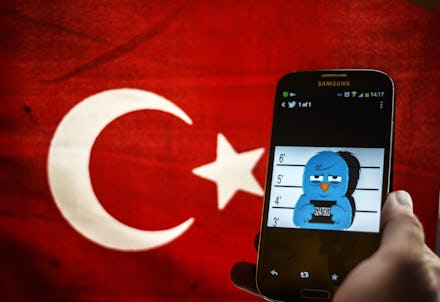#TwitterIsBlockedInTurkey Is Taking a Stand Against Government Silencing on Social Media

Turkey's plan to censor the Internet has backfired, big time.
Following a terrorist attack in Turkey last week in which prosecutor Mehmet Selim Kiraz was shot to death after being taken hostage in his office by members of the banned Revolutionary People's Liberation Party-Front, Turkish courts ordered ISPs to block social media sites on which images of the hostage were circulated on Monday. The result, Al Jazeera America reports, was that Turkish users quickly lost access to Twitter.
But rather than suppressing discontent, the tactic backfired. The hashtag #TwitterIsBlockedInTurkey went viral on Twitter:
Tens of thousands of #TwitterIsBannedInTurkey tweets, the majority of which mock the ban and many of which are from Turkey itself, flooded Twitter despite the government restrictions.
According to Hurriyet Daily News, courts ordered 166 sites offline in total. Presidential spokesman Ibrahim Kalin said at a press conference in Ankara that media organizations disseminating the images were acting like they were "spreading terrorist propaganda," per Reuters reporting. "This has to do with the publishing of the prosecutor's picture," Kalin said at the press conference. "What happened in the aftermath is as grim as the incident itself. The demand from the prosecutor's office is that this image not be used anywhere in electronic platforms."
Though the block was later lifted after Twitter complied with Turkey's request to remove images of the prosecutor being held at gunpoint, Reuters reported that YouTube remained blocked.
The Washington Post noted that a previous ban in March 2014 before municipal elections was abandoned amid reports that it was widely ineffective. During the current incident, countless tricks including widespread use of VPNs (virtual private networks) to bypass the blocks, enabled tech-savvy Turks to evade the ban. Other technical workarounds included posting via SMS or changing a device's DNS settings. As the Washington Post noted, the ban also came long after the images began being disseminated online.
Prime Minister Recep Tayyip Erdogan and the ruling Islamist Justice and Development Party have long had a contentious relationship with the Internet, with Erdogan telling a crowd during the March 2014 ban, "Twitter, mwitter! We will wipe out all of these." But as this incident again demonstrates, suppressing dissent is a lot harder than just ordering a few sites offline.